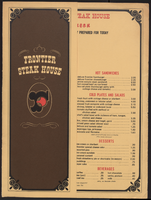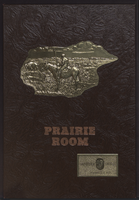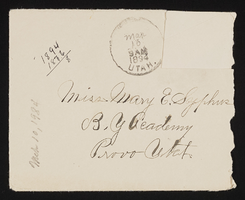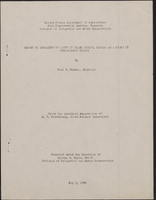Search the Special Collections and Archives Portal
Search Results

Frontier Steak House, luncheon menu
Date
Archival Collection
Description
Text

Prairie Room, menu
Date
Archival Collection
Description
Text
Bailey, Anna (Anna E.) (1921-2005)
Anna Bailey was born May 14, 1921 in Savannah, Georgia. Bailey arrived in Las Vegas in 1955 to perform as a dancer for the opening of the Moulin Rouge Hotel and Casino. Six months later the Rouge closed, leaving both Anna and her husband, Bob, without work, since Bob had been the house singer and emcee at the Hotel. Nevertheless, Anna and Bob decided to make Las Vegas their home, convinced in the growth potential of the city.
Person
University of Nevada, Las Vegas Collection of Transcripts and Journal Articles about Gambling
Identifier
Abstract
Collection contains transcripts from various American television news programs and journal articles about gambling from 1987 to 1992. The topics are broad and include various forms of gambling, problem gambling, and gaming venues.
Archival Collection
Multicolor Films, Inc. records, 1926 to 1935
Level of Description
Scope and Contents
The Multicolor Films, Inc. records (1926-1935) consists of administrative, advertising and publicity, financial, and legal records, as well as blueprints, specifications, and correspondence. Materials include black-and-white photographic prints and negatives, newspaper and magazine clippings, and financial reports detailing Howard Hughes' attempts at developing color prints for his films.
Archival Collection
Collection Name: Howard Hughes Film Production Records
Box/Folder: N/A
Archival Component

Letter and envelope from John M. Bunker, Logan City, Utah to Mary Etta Syphus, Provo, Utah
Date
Archival Collection
Description
From the Syphus-Bunker Papers (MS-00169). The folder contains an original handwritten letter, a typed transcription of the same letter, the original envelope with the stamp removed, and a copy of the original letter.
Text

Report on water spreading in Clark County, Nevada as a means of controlling floods, May 9, 1949
Date
Archival Collection
Description
Report on the efficacy of water spreading to disperse flood water in Southern Nevada. Under the immediate Supervision of A. T. Mitchelson, State Project Supervisor. Prepared under the direction of George D. Clyde, Chief, Division of Irrigation and Water Conservation
Text

Nevada Southern University 1st commencement program
Date
Archival Collection
Description
Commencement program from University of Nevada, Las Vegas Commencement Programs and Graduation Lists (UA-00115).
Text

Transcript of Interview with Michael Drakulich by Jane Finfrock, May 8, 1979
Date
Archival Collection
Description
Text
